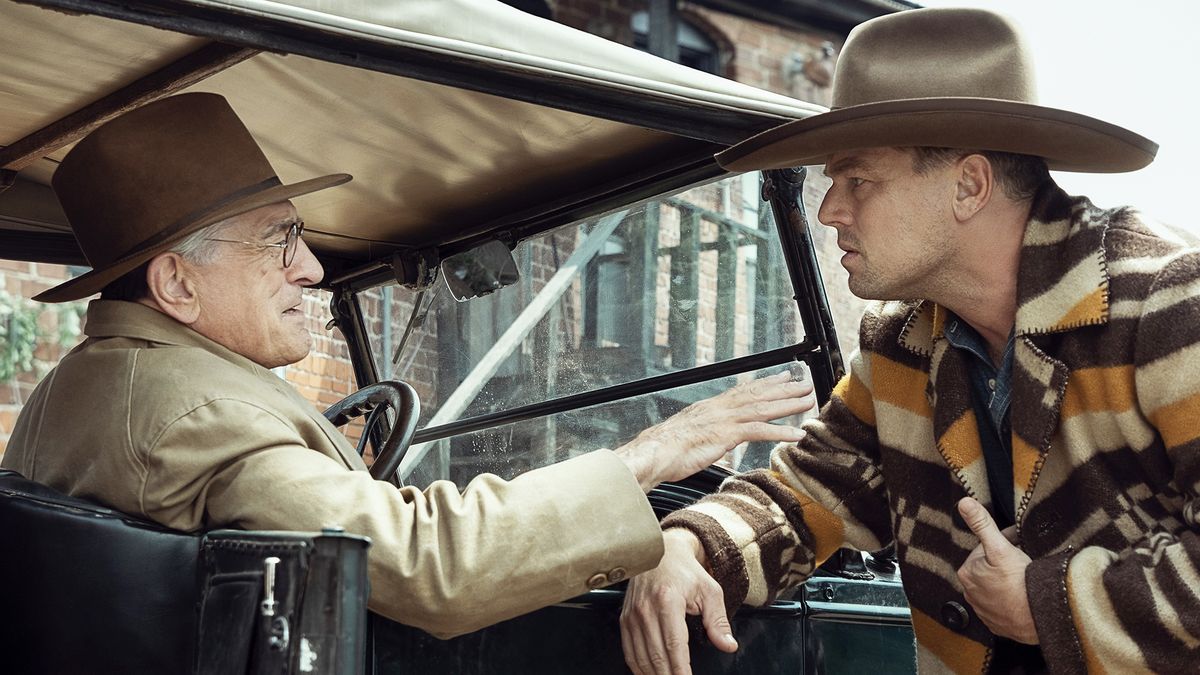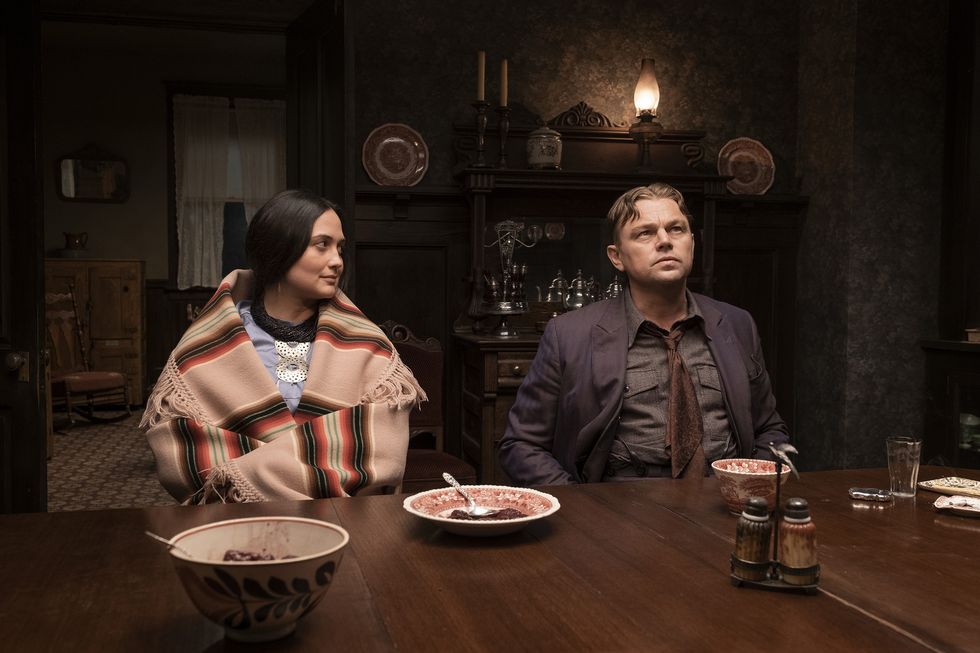Ernest Burkhart deserved a lot of things—jail time, poverty, his current evisceration in our history books—but in Killers of the Flower Moon, the new epic from Martin Scorsese, the director is careful to avoid the glory of a high-voltage, arrest. You know the type. In Goodfellas, Scorsese treated Henry Hill to pitter-pattering drums and another wise-ass voiceover moment. ("For a second, I thought I was dead. But when I heard all the noise, I knew they were cops. Only cops talk that way.") Colin Sullivan, The Departed: "I'm a sahrgent in the Massachusetts State Police Department, who the fuck are you?!" Billy Costigan, Jr.'s reply: "Shut [punch!] the fuck [punch!] up [punch!]" In The Irishman, the coppers pulled Tony Pro from a game of cards! In Flower Moon, Scorsese swerves the opposite way.
Instead, Ernest Burkhart, played by Leonardo DiCaprio, who was part of a real-life scheme in 1920s Oklahoma to marry Osage women and strip the riches of their oil wealth, meets a pathetic, non-violent, damn near silent end. By the time the big arrest comes, Bureau of Investigation agent Tom White (Jesse Plemons) knows full well that Burkhart plotted the murders of his wife's family. We see Burkhart—where else?—in a bar, drunk off his ass, flanked by his child. With all the characteristic blasé energy of Plemons's best characters, White and his men surround Burkhart and take him away. No music. No shouting. No guns.
And the twinge of disappointment you feel right when that happens? I get it. Three hours into this very, very long movie, you wanted one holy-shit, pow-bang! moment. I was craving it myself, until I saw what the quiet revealed—the bone-deep skeeze of a guy who, five too many whiskies in, is too dim to even whip up a convincing lie. It's the only way Scorsese could've laid bare Burkhart's wretchedness, and in turn, the ambition of the pillaging, white American man.
Scorsese's journey to making Flower Moon has been well-documented: He signed on to direct the film adaptation of David Grann's 2017 book, Killers of the Flower Moon: The Osage Murders and the Birth of the FBI, the same year it was published. Scorsese wrote the script from the Bureau of Investigation's perspective, until, as the director has said, DiCaprio suggested the heart of the story was Mollie Burkhart (Lily Gladstone), an Osage woman who fell in love with Ernest, a man controlled by his uncle, William Hale (Robert De Niro). The director then had multiple conversations with Osage leaders, knowing that, in many ways, Flower Moon wasn't his story to tell. At some point, Scorsese clearly realized that the only way to direct this film was to get out of the way. If you're willing to stop obsessing over its three-plus-hour runtime, you'll realise that Scorsese actually demonstrated great restraint—and that Flower Moon is one of the greatest films he's ever made as a result.
As someone who thought The Irishman would've ascended into gangster-film heaven had a motivated editor trimmed about 90 minutes off, I thought I'd feel the same about the slightly-longer Flower Moon. (I peed exactly four times in the 20 minutes leading up to the opening titles.) Then I witnessed the death of Mollie's mother, Lizzie, which Scorsese turns into one of the most sentimental and surreal moments of his career. In nearly complete silence, again, Lizzie dies in the arms of her daughters, only to wake up in the same bed, but in a different place—the afterlife, where she's met by Osage ancestors and gently taken away. I watched the funeral of Mollie's sister, Anna Kyle Brown, by way of Scorsese quietly moving his camera throughout the home. Much later, I saw the body of Mollie's four-year-old daughter, Anna, and wondered how she could've endured even a fraction of her pain.
If Scorsese had trimmed a funeral here, or a whisper between Mollie's sisters there, he would've committed the same sins as our history books: flattening the Osage Nation into a footnote, robbing them of all of the things that made them human. If Robbie Robertson's score would've bellowed during the bloodshed, he would've risked sensationalising the murders. This is what it looks like when a filmmaker takes the time to properly memorialise victims—or else you end up with Oppenheimer, which, despite its triumphs, sanitises the carnage of the atomic bomb.
In this summer's blockbuster release, director Christopher Nolan deftly explores the mind and motives of J. Robert Oppenheimer, but the work never shows us the bloodshed in a way that says, Look what was lost. This is how they suffered. Almost as soon as Flower Moon begins, we see a montage, shot in black and white, naming multiple Osage who were killed during this time. Scorsese details how they died, right up to a framed suicide. In Flower Moon, there's rarely a moment when we don't hear the laughter and the cries of the Osage people loud and clear.
That said, Flower Moon's surprising ending is where Scorsese truly unplugs the guitar. After Burkhart's conviction and his parting moment with Mollie, we're launched into a dark, stuffy theatre, where a group of men are recording a radio spot on the Osage murders. (It's reminiscent of This Is Your FBI, which was an FBI-backed, cartoonish retelling of some of the agency's cases. It was strangely prescient—think Netflix true crime before Netflix true crime.) The men reenact a generation's worth of pain with bells, whistles, and racist caricatures. You start thinking that Scorsese capped Flower Moon with a dig at our nation's true-crime obsession—which would be fitting, if a little trite. Then, the man himself shuffles to the mic.
Scorsese has appeared in many of his films (do you see the woman in the window?), but this feels different immediately. Black suit, slightly hunched, tepid. Almost as if he's afraid to say the words. This isn't the radio show anymore. He reads from Mollie Burkhart's obituary, which says she died of the very same disease we watched her suffer from in the film. Just as you wrap your mind around what he's doing, Scorsese utters of the conspiracy that killed so much of her family, “There was no mention of the murders.”
There was no mention of the murders.
Scorsese is alone, under a literal spotlight—not speaking to the audience in the theatre on-screen, but to us. See how greed, ambition, and war have destroyed lives. See who they were. See how they suffered. See our nasty habit of erasing them. See it here, right now. It's a plea.
Are you listening?













